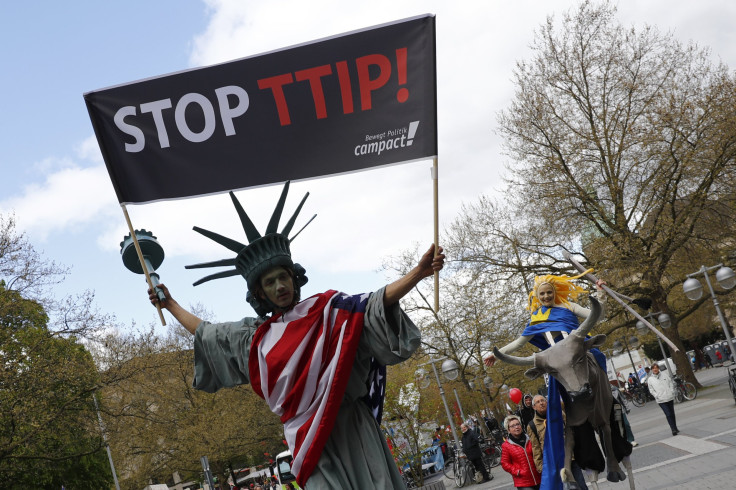Greenpeace Publishes Leaked TTIP Documents Revealing ‘Grave’ Environmental, Public Health Concerns

UPDATE: 6 a.m. EDT — Greenpeace on Monday released a raft of leaked documents detailing talks between the European Union and the United States regarding a far-reaching free-trade deal. In a statement, the environmental nonprofit said "grave concerns" over environment and public health in the EU were laid bare in the 248 pages of leaked Transatlantic Trade and Investment Partnership negotiating texts.
"These documents make clear the scale and scope of the trade citizens of the United States and the European Union are being asked to make in pursuit of corporate profits. It is time for the negotiations to stop, and the debate to begin," Sylvia Borren, executive director of Greenpeace Netherlands, said in the statement. "We call on the negotiators to release the latest, complete text to facilitate that discussion, and we ask that the negotiations be stopped until these questions, and many more have been answered. Until we can fully engage in a debate about the standards we and our planet need and want."
Among other things, the leaked documents, which Greenpeace says comprise about three-fourths of the existing "consolidated texts" — documents presenting the EU and U.S. positions on issues side by side — reveal that the U.S. is urging the E.U. negotiators to adopt more lax regulations insofar as product regulation in the 28-nation bloc is concerned. These provisions, if adopted, would replace the stringent "precautionary principles" currently used in the EU.
"In the chapter on sanitary and phytosanitary protection measures, proposals by the US delegation refers to 'products of modern agricultural technology,' which clearly indicates their pressure to get rid of trade barriers for genetically-modified organisms (GMOs), as the proposal also refers to the Global Low Level Presence Initiative, which addresses contamination of agricultural products by GMOs," Greenpeace said in an analysis of the leaked documents.
Currently, laws regulating cultivation of GM plants are much stricter in the EU than in the U.S. Another sticking point in the ongoing negotiations, as revealed through the leaked text, relates to the establishment of commercial arbitration courts, where companies can sue governments under the World Trade Organization (WTO) rules. Existing provisions would "allow corporations or other actors to have unprecedented access to (and interference with) regulator's deliberative processes on both sides of the Atlantic and in the case of disputes, allow the complaining party to choose the forum for resolving the dispute, which will undoubtedly result in 'forum shopping' to produce a result to the complainant's liking," Greenpeace said in its analysis.
Original story:
Leaked documents accessed by the environmental nonprofit Greenpeace suggest that the United States and the European Union are reportedly facing “irreconcilable” differences in their ongoing discussions over the Transatlantic Trade and Investment Partnership (TTIP). In a statement released Sunday, Greenpeace said the documents, which include over 240 pages of leaked negotiating texts, will be released Monday.
The documents reveal “the U.S. position and deliberate attempts to change the EU democratic legislative process,” Greenpeace said in the statement, listing out several areas of concern, including what it says are demands by U.S. negotiators that, if met, would require the EU to break its climate change pledges and environment protection promises.
According to Greenpeace, the negotiating texts do not include any mention of the World Trade Organization provision that allows countries to restrict trade “protect human, animal and plant life or health.” Additionally, the documents reportedly reveal that the U.S. negotiators are threatening to block European car exports to force EU to purchase more American agricultural products.
“These leaked documents confirm what we have been saying for a long time: TTIP would put corporations at the centre of policy-making, to the detriment of environment and public health. We have known that the EU position was bad, now we see the US position is even worse. A compromise between the two would be unacceptable,” Jorgo Riss, director of Greenpeace EU, said in the statement.
According to the Guardian, which has seen the leaked documents, while the EU has so far not accepted the U.S. demands, it has yet to submit counterproposals.
“These leaked documents give us an unparalleled look at the scope of US demands to lower or circumvent EU protections for environment and public health as part of TTIP. The EU position is very bad, and the US position is terrible,” Riss told the Guardian. “The way is being cleared for a race to the bottom in environmental, consumer protection and public health standards.”
Negotiations to hammer out the TTIP have been going on for the last three years. While the deal’s backers claim that it would boost trade between U.S. and EU by easing customs duties and removing red tape and restrictions on investments on both sides of the Atlantic, its critics — especially in the EU — argue that TTIP would hurt small- and medium-sized enterprises, allow large corporations to flout environmental regulations and give them undue influence over elected governments.
© Copyright IBTimes 2024. All rights reserved.












